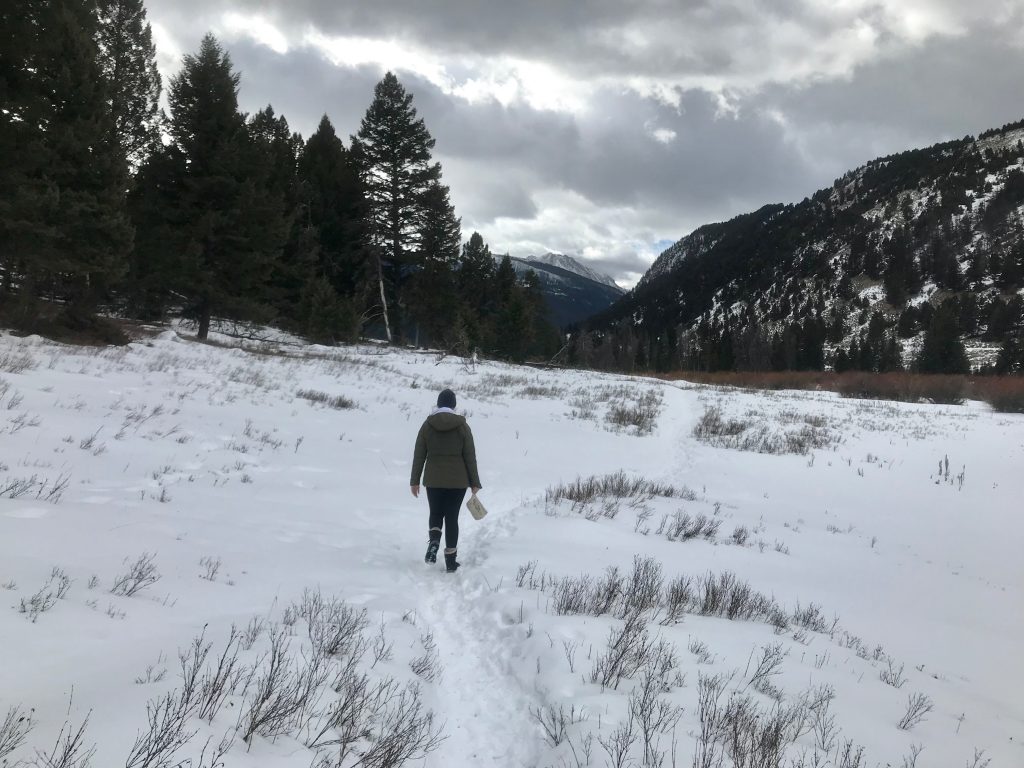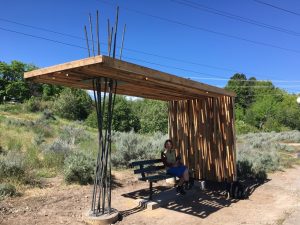By Kalle Fox
Mapping out my future is something I can openly admit to being terrible at. In May of 2018 I graduated from college with a Bachelor’s degree in anthropology, a summer job as a trail crew member lined up in Vermont, and, like many young adults of my generation, a vague uncertainty of what was to come for the rest of my life. The liberal arts college experience was a double-edged sword—it allowed me to expand my knowledge into several fields, but not to the extent that I could leave with a clearly defined career path for myself. For the past 1-2 years I’ve been caught in between utilizing the interdisciplinary research skills of anthropology, and the passion for the environment that I discovered too late in my academic career to make a change in my degree path. During the months leading up to graduation, the fear that the past four years of academia was a complete waste of time would come and go. Somehow, the combination of these tools has led me to Butte, Montana, where I’m serving a six-month AmeriCorps term with the Low-Income Energy Assistance Program (LIHEAP) Clearinghouse. As of right now I am researching opportunities for LIHEAP grantees to better implement renewable energy alternatives for low-income households around the country. The position allows me to apply the critical thinking, writing and research skills I gained in my undergraduate career and do so in a way that, if I’m successful, will benefit communities in need and positively impact parts of the environment.
On the one hand, it’s both exciting and enriching to be able to apply my academic credentials for the first time in my post-graduate era. On the other hand, there’s more riding on my performance than just a decent grade or a change in my GPA, so there’s already more pressure to be able to execute my tasks for this term of service. It’s been a month so far, and already my mindset has been dancing back and forth between “I’m making great progress so far!” and “I’m way in over my head in thinking I’m qualified for this”. There are days when I feel confident and productive, and also days where I stare out the window of my office, longing to hike the countless mountain ranges of Montana and nothing else. Joining AmeriCorps was intended to be the first step in building a career towards environmental services, but right now my duties have little to do with the environment and more on increasing energy efficiency and reducing costs for low-income households. While it’s still meaningful in the sense that I’m pursuing an end goal of benefiting an undeserved population of the US, it’s not necessarily the type of work I originally set out to accomplish. It’s more difficult to see the tangible difference one makes when all you see during your work day is a computer screen as opposed to performing manual or hands-on labor where you can see your progress at the end of the day.
In the moments of doubt, I think back to my summer on the trail crew and why I chose to pursue a different line of work. While I enjoyed getting to work in the outdoors on conservation and recreation projects, it didn’t give me the level of fulfillment I was looking for as an aspiring environmental steward. I wanted an opportunity to work within the organizations so I could gain more insight into how environmental efforts develop behind the scenes, as opposed to just working out in the field. Even though I’m currently confined to a desk space in the dead of winter, trying to make sense of dozens of documents and reports about program funding, utility providers, eligibility requirements and so on, there is a stronger sense of purpose I feel here than I have with other organizations I’ve worked with in the past. Even if this term of service isn’t as outdoorsy or as immediately gratifying as I initially wanted, I chose to serve AmeriCorps because I wanted to find a means to serve the environment and/or communities in need. For years I’ve lived in my own bubble of worries and concerns for too long, and now I finally have the opportunity to participate in something much greater than my own personal satisfaction—it’s a humbling position to be in. Even then, I don’t have much to complain about outside of the eight-hour desk confinement. I have comfortable living quarters, friendly coworkers who I spend time with outside of work, and unworldly sunrises and sunsets that I get to witness most days. Not only that, I’ve still been able to fulfill my environmental wanderlust desires by spending every weekend venturing out into beautiful Montana to explore new towns and hiking trails.
As I mentioned in the beginning, I’m not very good at developing the big picture of my life—truth be told, I have yet to figure out what my plans are for when my service with AmeriCorps ends. However, despite being a young post-graduate with little direction and an overwhelming amount of paths to pursue, I’m not as afraid as I was a year ago. AmeriCorps has taught me that focusing on the work I do each day, no matter what it is, is more important than thinking about what I might be doing months or years down the road. While I might be inept at determining my future, I’d like to think that I’m well-equipped to make the best of my present circumstances.








